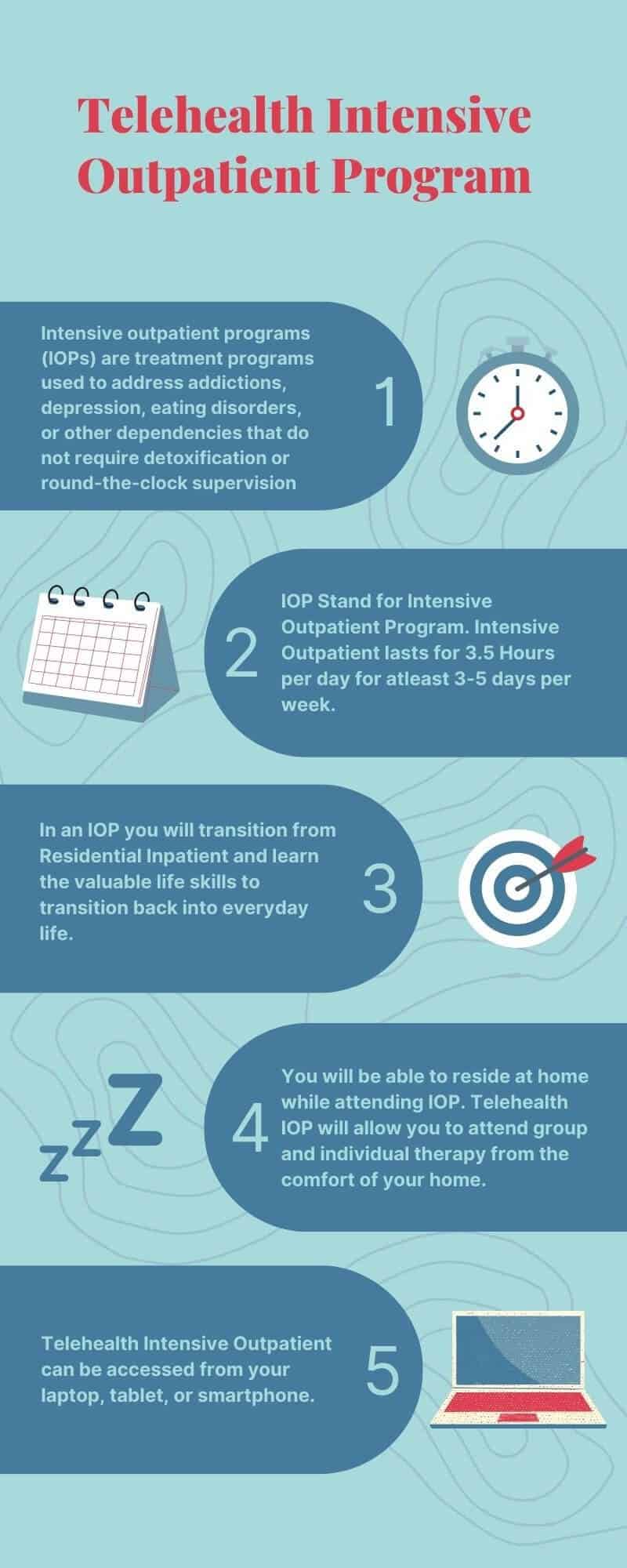The Advantages of Intensive Outpatient Program (IOP) for Long-Term Wellness.
The Advantages of Intensive Outpatient Program (IOP) for Long-Term Wellness.
Blog Article
Browsing the Complexities of Twin Diagnosis Treatment Within an Extensive Outpatient Program Setting
In the world of psychological health and dependency therapy, the junction of twin diagnosis presents a nuanced difficulty that requires a comprehensive and tailored method. By discovering the ins and outs of twin diagnosis therapy within this extensive outpatient context, a clearer path emerges in the direction of holistic and lasting recovery for those grappling with these intertwined challenges.
Dual Medical Diagnosis Summary

Comprehending dual medical diagnosis is important as it calls for a thorough and integrated technique to therapy. By acknowledging the interplay between substance usage and mental health, doctor can tailor interventions to satisfy the one-of-a-kind needs of each person. This alternative technique not just addresses signs and symptoms but likewise targets hidden aspects that contribute to the double medical diagnosis.
Furthermore, without treatment double medical diagnosis can lead to a cycle of regression and aggravating mental health signs and symptoms. By acknowledging the intricacy of dual diagnosis and giving specialized treatment, health care specialists can support individuals in attaining long-term recovery and boosted psychological health.
Tailored Therapy Strategies
Recognizing the detailed interaction in between substance usage conditions and psychological wellness conditions, the development of customized therapy plans is vital in resolving the complexities of double diagnosis in psychological health and wellness therapy. Customized treatment plans are personalized strategies that take into consideration the one-of-a-kind needs, difficulties, and objectives of individuals dealing with dual diagnosis. These plans are developed collaboratively by a multidisciplinary group of specialists, including psychiatrists, psychologists, social workers, and addiction experts, to ensure thorough and incorporated care.
Tailored treatment strategies generally entail a mix of therapies, medicines, and behavioral treatments that target both the compound use problem and the psychological wellness condition simultaneously. These plans may include cognitive-behavioral treatment, dialectical actions treatment, medication-assisted therapy, private therapy, group treatment, and household therapy, to name a few evidence-based interventions. By customizing treatment strategies to individual situations, tailored plans can address the origin of dual diagnosis, advertise long-lasting healing, and enhance general quality of life for people fighting with co-occurring conditions.
Integrated Care Strategy
An incorporated care technique in double medical diagnosis therapy integrates medical, mental, and social interventions to deal with the complicated needs of people with co-occurring substance usage disorders and psychological health and wellness conditions. This approach acknowledges that treating one aspect of a double medical diagnosis without resolving the various other can result in ineffective outcomes. By incorporating clinical treatments such as drug monitoring for mental health problems with psychological therapies like cognitive-behavioral treatment for substance use problems, individuals receive extensive care that targets all facets of their double medical diagnosis.
By incorporating social interventions like family therapy, vocational assistance, and neighborhood resources, the treatment comes to be extra all natural try this website and customized to the individual's certain needs - Intensive Outpatient Program (IOP). In general, an incorporated care strategy in dual diagnosis treatment within an intensive outpatient program setup intends to offer thorough, effective, and personalized treatment to people encountering co-occurring disorders.
Challenges in IOP Setting
In the context of dual diagnosis therapy within an extensive outpatient program, browsing the complexities of co-occurring compound use disorders and psychological health and wellness problems presents significant obstacles. Among the primary obstacles in the IOP setup is the sychronisation of care between psychological health and wellness specialists and substance abuse experts to make sure a detailed treatment approach. This requires reliable communication, collaboration, and a deep understanding of how these problems interact and affect each various other.

Moreover, addressing preconception and resistance to therapy within the IOP setup can hinder progression. Some individuals may be reluctant to reveal their twin medical diagnosis or might feel ashamed, hindering their interaction in the therapeutic procedure. Getting over these barriers requires an encouraging and non-judgmental setting that cultivates trust and visibility.

Collaborative Professional Initiatives
Reliable twin medical diagnosis treatment in an extensive outpatient program demands smooth collaboration amongst psychological health experts and material abuse professionals to make certain an extensive and integrated method to care. By working together, these specialists can develop personalized therapy strategies that cater to the special demands of each patient, considering both their mental health and material misuse challenges.
Collective efforts also extend to regular communication and details sharing among employee to make sure a cohesive therapy approach. This might entail situation conferences, joint sessions with the client, or shared documents to track progress and adjust treatment strategies as required. In addition, cooperation may include website here involving various other healthcare specialists such as medical care doctors or family members therapists to offer holistic assistance to the client. Ultimately, a united front of specialists collaborating improves the efficiency of double diagnosis treatment within an intensive outpatient program.
Verdict
To conclude, effective double diagnosis treatment within an extensive More hints outpatient program setting calls for tailored treatment strategies and an integrated treatment approach. Challenges might arise in this setting, but collective efforts amongst specialists can assist navigate these complexities. By resolving the distinct requirements of people with co-occurring psychological wellness and compound make use of problems, IOP programs can provide detailed and holistic care to sustain healing and general well-being.
Report this page